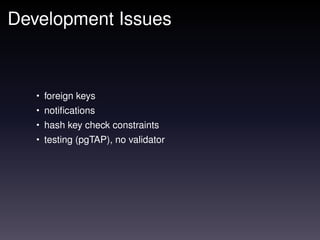Getting Started with PL/Proxy
- 1. Getting Started with PL/Proxy Peter Eisentraut [email protected] F-Secure Corporation PostgreSQL Conference East 2011 CC-BY
- 2. Concept • a database partitioning system implemented as a procedural language • “sharding”/horizontal partitioning • PostgreSQL’s No(t-only)SQL solution
- 3. Concept application application application application frontend partition 1 partition 2 partition 3 partition 4
- 4. Areas of Application • high write load • (high read load) • allow for some “eventual consistency” • have reasonable partitioning keys • use/plan to use server-side functions
- 5. Example Have:1 CREATE TABLE products ( prod_id serial PRIMARY KEY , category integer NOT NULL , title varchar (50) NOT NULL , actor varchar (50) NOT NULL , price numeric (12 ,2) NOT NULL , special smallint , common_prod_id integer NOT NULL ); INSERT INTO products VALUES (...) ; UPDATE products SET ... WHERE ...; DELETE FROM products WHERE ...; plus various queries 1 dellstore2 example database
- 6. Installation • Download: http://plproxy.projects.postgresql.org, Deb, RPM, . . . • Create language: psql -d dellstore2 -f ...../plproxy.sql
- 7. Backend Functions I CREATE FUNCTION insert_product ( p_category int , p_title varchar , p_actor varchar , p_price numeric , p_special smallint , p_common_prod_id int ) RETURNS int LANGUAGE plpgsql AS $$ DECLARE cnt int ; BEGIN INSERT INTO products ( category , title , actor , price , special , common_prod_id ) VALUES ( p_category , p_title , p_actor , p_price , p_special , p_common_prod_id ) ; GET DIAGNOSTICS cnt = ROW_COUNT ; RETURN cnt ; END ; $$ ;
- 8. Backend Functions II CREATE FUNCTION update_product_price ( p_prod_id int , p_price numeric ) RETURNS int LANGUAGE plpgsql AS $$ DECLARE cnt int ; BEGIN UPDATE products SET price = p_price WHERE prod_id = p_prod_id ; GET DIAGNOSTICS cnt = ROW_COUNT ; RETURN cnt ; END ; $$ ;
- 9. Backend Functions III CREATE FUNCTION delete_product_by_title ( p_title varchar ) RETURNS int LANGUAGE plpgsql AS $$ DECLARE cnt int ; BEGIN DELETE FROM products WHERE title = p_title ; GET DIAGNOSTICS cnt = ROW_COUNT ; RETURN cnt ; END ; $$ ;
- 10. Frontend Functions I CREATE FUNCTION insert_product ( p_category int , p_title varchar , p_actor varchar , p_price numeric , p_special smallint , p_common_prod_id int ) RETURNS SETOF int LANGUAGE plproxy AS $$ CLUSTER ' dellstore_cluster '; RUN ON hashtext ( p_title ) ; $$ ; CREATE FUNCTION update_product_price ( p_prod_id int , p_price numeric ) RETURNS SETOF int LANGUAGE plproxy AS $$ CLUSTER ' dellstore_cluster '; RUN ON ALL ; $$ ;
- 11. Frontend Functions II CREATE FUNCTION delete_product_by_title ( p_title varchar ) RETURNS int LANGUAGE plpgsql AS $$ CLUSTER ' dellstore_cluster '; RUN ON hashtext ( p_title ) ; $$ ;
- 12. Frontend Query Functions I CREATE FUNCTION get_product_price ( p_prod_id int ) RETURNS SETOF numeric LANGUAGE plproxy AS $$ CLUSTER ' dellstore_cluster '; RUN ON ALL ; SELECT price FROM products WHERE prod_id = p_prod_id ; $$ ;
- 13. Frontend Query Functions II CREATE FUNCTION get_products_by_category ( p_category int ) RETURNS SETOF products LANGUAGE plproxy AS $$ CLUSTER ' dellstore_cluster '; RUN ON ALL ; SELECT * FROM products WHERE category = p_category ; $$ ;
- 14. Unpartitioned Small Tables CREATE FUNCTION insert_category ( p_categoryname ) RETURNS SETOF int LANGUAGE plproxy AS $$ CLUSTER ' dellstore_cluster '; RUN ON 0; $$ ;
- 15. Which Hash Key? • natural keys (names, descriptions, UUIDs) • not serials (Consider using fewer “ID” fields.) • single columns • group sensibly to allow joins on backend
- 16. Set Basic Parameters • number of partitions (2n ), e. g. 8 • host names, e. g. • frontend: dbfe • backends: dbbe1, . . . , dbbe8 • database names, e. g. • frontend: dellstore2 • backends: store01, . . . , store08 • user names, e. g. storeapp • hardware: • frontend: lots of memory, normal disk • backends: full-sized database server
- 17. Set Basic Parameters • number of partitions (2n ), e. g. 8 • host names, e. g. • frontend: dbfe • backends: dbbe1, . . . , dbbe8 (or start at 0?) • database names, e. g. • frontend: dellstore2 • backends: store01, . . . , store08 (or start at 0?) • user names, e. g. storeapp • hardware: • frontend: lots of memory, normal disk • backends: full-sized database server
- 18. Configuration CREATE FUNCTION plproxy . get_cluster_partitions ( cluster_name text ) RETURNS SETOF text LANGUAGE plpgsql AS $$ ... $$ ; CREATE FUNCTION plproxy . get_cluster_version ( cluster_name text ) RETURNS int LANGUAGE plpgsql AS $$ ... $$ ; CREATE FUNCTION plproxy . get_cluster_config ( IN cluster_name text , OUT key text , OUT val text ) RETURNS SETOF record LANGUAGE plpgsql AS $$ ... $$ ;
- 19. get_cluster_partitions Simplistic approach: CREATE FUNCTION plproxy . get_cluster_partitions ( cluster_name text ) RETURNS SETOF text LANGUAGE plpgsql AS $$ BEGIN IF cluster_name = ' dellstore_cluster ' THEN RETURN NEXT ' dbname = store01 host = dbbe1 '; RETURN NEXT ' dbname = store02 host = dbbe2 '; ... RETURN NEXT ' dbname = store08 host = dbbe8 '; RETURN ; END IF ; RAISE EXCEPTION ' Unknown cluster '; END ; $$ ;
- 20. get_cluster_version Simplistic approach: CREATE FUNCTION plproxy . get_cluster_version ( cluster_name text ) RETURNS int LANGUAGE plpgsql AS $$ BEGIN IF cluster_name = ' dellstore_cluster ' THEN RETURN 1; END IF ; RAISE EXCEPTION ' Unknown cluster '; END ; $$ LANGUAGE plpgsql ;
- 21. get_cluster_config CREATE OR REPLACE FUNCTION plproxy . get_cluster_config ( IN cluster_name text , OUT key text , OUT val text ) RETURNS SETOF record LANGUAGE plpgsql AS $$ BEGIN -- same config for all clusters key := ' connection_lifetime '; val := 30*60; -- 30 m RETURN NEXT ; RETURN ; END ; $$ ;
- 22. Table-Driven Configuration I CREATE TABLE plproxy . partitions ( cluster_name text NOT NULL , host text NOT NULL , port text NOT NULL , dbname text NOT NULL , PRIMARY KEY ( cluster_name , dbname ) ); INSERT INTO plproxy . partitions VALUES ( ' dellstore_cluster ' , ' dbbe1 ' , ' 5432 ' , ' store01 ') , ( ' dellstore_cluster ' , ' dbbe2 ' , ' 5432 ' , ' store02 ') , ... ( ' dellstore_cluster ' , ' dbbe8 ' , ' 5432 ' , ' store03 ') ;
- 23. Table-Driven Configuration II CREATE TABLE plproxy . cluster_users ( cluster_name text NOT NULL , remote_user text NOT NULL , local_user NOT NULL , PRIMARY KEY ( cluster_name , remote_user , local_user ) ); INSERT INTO plproxy . cluster_users VALUES ( ' dellstore_cluster ' , ' storeapp ' , ' storeapp ') ;
- 24. Table-Driven Configuration III CREATE TABLE plproxy . remote_passwords ( host text NOT NULL , port text NOT NULL , dbname text NOT NULL , remote_user text NOT NULL , password text , PRIMARY KEY ( host , port , dbname , remote_user ) ); INSERT INTO plproxy . remote_passwords VALUES ( ' dbbe1 ' , ' 5432 ' , ' store01 ' , ' storeapp ' , ' Thu1Ued0 ') , ... -- or use . pgpass ?
- 25. Table-Driven Configuration IV CREATE TABLE plproxy . cluster_version ( id int PRIMARY KEY ); INSERT INTO plproxy . cluster_version VALUES (1) ; GRANT SELECT ON plproxy . cluster_version TO PUBLIC ; /* extra credit : write trigger that changes the version when one of the other tables changes */
- 26. Table-Driven Configuration V CREATE OR REPLACE FUNCTION plproxy . get_cluster_partitions ( p_cluster_name text ) RETURNS SETOF text LANGUAGE plpgsql SECURITY DEFINER AS $$ DECLARE r record ; BEGIN FOR r IN SELECT ' host = ' || host || ' port = ' || port || ' dbname = ' || dbname || ' user = ' || remote_user || ' password = ' || password AS dsn FROM plproxy . partitions NATURAL JOIN plproxy . cluster_users NATURAL JOIN plproxy . remote_passwords WHERE cluster_name = p_cluster_name AND local_user = session_user ORDER BY dbname -- important LOOP RETURN NEXT r. dsn ; END LOOP ; IF NOT found THEN RAISE EXCEPTION ' no such cluster : % ', p_cluster_name ; END IF ; RETURN ; END ; $$ ;
- 27. Table-Driven Configuration VI CREATE FUNCTION plproxy . get_cluster_version ( p_cluster_name text ) RETURNS int LANGUAGE plpgsql AS $$ DECLARE ret int ; BEGIN SELECT INTO ret id FROM plproxy . cluster_version ; RETURN ret ; END ; $$ ;
- 28. SQL/MED Configuration CREATE SERVER dellstore_cluster FOREIGN DATA WRAPPER plproxy OPTIONS ( connection_lifetime ' 1800 ' , p0 ' dbname = store01 host = dbbe1 ' , p1 ' dbname = store02 host = dbbe2 ' , ... p7 ' dbname = store08 host = dbbe8 ' ); CREATE USER MAPPING FOR storeapp SERVER dellstore_cluster OPTIONS ( user ' storeapp ' , password ' sekret ') ; GRANT USAGE ON SERVER dellstore_cluster TO storeapp ;
- 29. Hash Functions RUN ON hashtext ( somecolumn ) ; • want a fast, uniform hash function • typically use hashtext • problem: implementation might change • possible solution: https://github.com/petere/pgvihash
- 30. Sequences shard 1: ALTER SEQUENCE products_prod_id_seq MINVALUE 1 MAXVALUE 100000000 START 1; shard 2: ALTER SEQUENCE products_prod_id_seq MINVALUE 100000001 MAXVALUE 200000000 START 100000001; etc.
- 31. Aggregates Example: count all products Backend: CREATE FUNCTION count_products () RETURNS bigint LANGUAGE SQL STABLE AS $$SELECT count (*) FROM products$$ ; Frontend: CREATE FUNCTION count_products () RETURNS SETOF bigint LANGUAGE plproxy AS $$ CLUSTER ' dellstore_cluster '; RUN ON ALL ; $$ ; SELECT sum ( x ) AS count FROM count_products () AS t(x);
- 32. Dynamic Queries I a. k. a. “cheating” ;-) CREATE FUNCTION execute_query ( sql text ) RETURNS SETOF RECORD LANGUAGE plproxy AS $$ CLUSTER ' dellstore_cluster '; RUN ON ALL ; $$ ; CREATE FUNCTION execute_query ( sql text ) RETURNS SETOF RECORD LANGUAGE plpgsql AS $$ BEGIN RETURN QUERY EXECUTE sql ; END ; $$ ;
- 33. Dynamic Queries II SELECT * FROM execute_query ( ' SELECT title , price FROM products ') AS ( title varchar , price numeric ) ; SELECT category , sum ( sum_price ) FROM execute_query ( ' SELECT category , sum ( price ) FROM products GROUP BY category ') AS ( category int , sum_price numeric ) GROUP BY category ;
- 34. Repartitioning • changing partitioning key is extremely cumbersome • adding partitions is somewhat cumbersome, e. g., to split shard 0: COPY ( SELECT * FROM products WHERE hashtext ( title :: text ) & 15 <> 0) TO ' somewhere '; DELETE FROM products WHERE hashtext ( title :: text ) & 15 <> 0; Better start out with enough partitions!
- 35. PgBouncer application application application application frontend PgBouncer PgBouncer PgBouncer PgBouncer partition 1 partition 2 partition 3 partition 4 Use pool_mode = statement
- 36. Development Issues • foreign keys • notifications • hash key check constraints • testing (pgTAP), no validator
- 37. Administration • centralized logging • distributed shell (dsh) • query canceling/timeouts • access control, firewalling • deployment
- 38. High Availability Frontend: • multiple frontends (DNS, load balancer?) • replicate partition configuration (Slony, Bucardo, WAL) • Heartbeat, UCARP, etc. Backend: • replicate backends shards individually (Slony, WAL, DRBD) • use partition configuration to configure load spreading or failover
- 39. Advanced Topics • generic insert, update, delete functions • frontend joins • backend joins • finding balance between function interface and dynamic queries • arrays, SPLIT BY • use for remote database calls • cross-shard calls • SQL/MED (foreign table) integration
- 40. The End








































